No Results Found
The page you requested could not be found. Try refining your search, or use the navigation above to locate the post.

The page you requested could not be found. Try refining your search, or use the navigation above to locate the post.
Are you preparing for the JAMB UTME English Language (Use of English) exam and searching for reliable past questions and answers to boost your performance? You’ve come to the right place! On Eduonwheels, we provide JAMB UTME English Language (Use of English) Past Questions and Answers Free 2010 — a comprehensive, easy-to-access study resource designed to help Nigerian students master the Use of English section with confidence.
This 2010 JAMB English past question compilation includes objective questions, answers, and explanations covering essential topics such as comprehension, lexis and structure, oral forms, and summary writing. Whether you’re a student in Lagos, Abuja, Port Harcourt, Enugu, Ibadan, or anywhere across Nigeria, our free download and online access make exam preparation simple, fast, and convenient.
Start practicing now with Eduonwheels’ JAMB UTME English Language (Use of English) Past Questions and Answers Free 2010 and get ahead of the competition. Boost your English skills, understand JAMB question trends, and increase your chances of scoring high in your next UTME examination!
Ready to ace your JAMB UTME Use of English exam? Eduonwheels provides comprehensive resources for English Language teaching and learning, specifically designed for JAMB students preparing for their exams. Get started with our free 2010 past questions! Images: 1.
Questions: Numbered: 1 – 100
PASSAGE I
Like a clock with the pendulum in full swing, the mind moves as fast as time. But we ought to mind our thoughts, for if they turn to be our enemies, they will be too many for us and will drag us down to ruin.
But some people may say that they cannot help having bad thoughts even though they sting like vipers. That may be true, but the question is do they hate them or not? We cannot keep thieves from looking in at our windows, but if we open our doors to them and receive them joyfully, we are as bad as they. We cannot help the birds flying over our heads; but we may keep them from building their nests in our hair. Vain thoughts will knock at the door but we must not open to them.
Though bad and evil thoughts rise in our hearts, they must not be allowed to reign. He who turns a morsel over and over in his mouth does so because he likes the flavour, and he who meditates upon evil, loves it, and is ripe to commit it. Think of the devil, and he will appear, turn your thoughts towards evil and your hands will soon follow. Snails leave their slime behind them, and so do vain thoughts. An arrow may fly through the air, and leave no trace, but an evil thought always leaves a trail like a serpent.
Where there is much traffic of bad thinking, there will be much mire and dirt. Every wave of wicked thought adds something to the corruption which rots upon the shore of life. It is dreadful to think that a vile imagination, once indulged, gets the key of our minds, and can get in again very easily, whether or not we let it in, and what may follow, no one knows. Nurse evil on the laps of thought, and it will grow into a giant.
Therefore, there is wisdom in watching every day, the thoughts and imaginations of our hearts. Good thoughts are blessed guests and should be welcomed, well fed, and much sought after, but bad thoughts must fly out as swiftly as they moved in.
Questions: 1 – 5
1. Which question paper type of use of English is given to you?
A. type A B. type B C. type C D. type D
2. Which of the following statements represents the view expressed by the writer in the first paragraph?
A. Evil thoughts will eventually ruin the evil man B. If we do not stop the pendulum of thoughts from swinging, our thoughts will soon become our enemies C. Too many evil thoughts have fatal consequences D. It is possible to decide what controls our thoughts
3. From the argument in the second paragraph, it can be concluded that evil thoughts control the lives of people who
A. are helpless because they fly out of their minds B. cherish idle and slothful ways C. are thieves with evil instincts D. treasure and ruminate on them
4. The expression “Think of the devil and he will appear…” as used in the passage, suggests that
A. like the devil thoughts must not reign in our hearts B. evil thoughts are fantasies which exist only in people’s minds C. uncontrolled evil thoughts may lead to evil deeds D. the devil gives evil thoughts only to those who invite him in
5. Which of the following statements summarizes the argument of the last paragraph?
A. Heavy traffic on a miry and dirty road may lead to evil thoughts B. The more evil we think, the more vile we are likely to become C. Evil people should not be welcomed as guests in our homes the same way as we welcome good people D. Evil thoughts control the key to the human heart and no one can keep them out
PASSAGE II
In 1962, a team of scientists produced a special radio station that had a range of fifteen miles. Even though communication was being accomplished in space at a range of more than a million times this distance, the new radio station caused more excitement among scientists. The reason: its power supply was a ‘battery’ made of bacteria. For the first time, practical amounts of electricity were being produced by a form of life and put to use.
The ‘bio cell’, the new power supply, had a liquid fuel containing tiny forms of life that changed the fuel directly into electric energy. This was far more than an interesting experiment. The bio cell is being developed as a producer of electricity for radios, for signals to guide ships, for lighting and for other uses. Though the working bio cell is only a few years old, some scientists feel that it will one day produce power as cheaply as is now being done by other methods, and that the bio cell will use materials that would otherwise be considered a waste. Early bio cells were powered with sugar, but a wide range of fuels can be used. Work is being done using sea water to feed the bacteria.
Electricity from living cells is no new idea. Man experienced the strange ‘shock’ produced by some fish even before electricity was really discovered. Then in time, there were other discoveries. Benjamin Franklin found that lightning in the sky was electricity. Luigi Galvani found some electricity in the muscles and nerves of animals. But the African catfish produces far more electricity than most other living creatures. And another fish, the electric eel, well named, for it has an even greater electric charge. Research workers also discovered that even humans produce small amounts of electricity in their bodies. Our hearts produce a very small amount that can be measured, so do our brains. The bio cell is completely new in the field of power production and, as yet, no mass-produced models have begun to replace the older types of batteries. It might be wondered, then, what the excitement is all about.
Questions: 6 – 10
6. A suitable title for the passage is
A. Energy from Living Things B. Electricity and Living Creatures C. Bio cell and Scientific Discoveries D. The Bio cell’s Future
7. The writer’s posture, as conveyed in the statement “Electricity from living cells is no new idea”, can be described as
A. ineffectual B. contentious C. logical D. unguarded
8. Which of the following is true according to the passage?
A. Scientists felt that bio cells would produce very costly energy B. Bio cells, at the beginning, derived their energy from sugar C. Sugar and fuel were initially used as sources of energy for bio cells D. Bio cells were forms of power used by the scientists
9. The inventors of bio cell justified the need for it by saying that it would
A. develop ways for changing bio cells into fuel for use B. yield a source of energy without much spending C. produce electricity for all types of machines D. produce signals to guide all ships and other vessels
10. According to the passage, electricity was first discovered in
A. hearts and brains B. muscles of animals C. lightning D. fish
PASSAGE III
Though assumption is the lowest level of knowledge, it is still a form of knowledge, and knowledge is key. Assumptions are the foundation upon which interpretations and conclusions are built. Everything in life operates under certain assumptions.
We make management decisions based on the assumptions we hold about how management ought to function and how people ought to be governed. For some, it is conscious, for others, it is unconscious but potent all the same. Our assumptions will either drown us or help us soar through life.
We have always seen life as an immense mansion with many rooms. Some rooms lead to wealth, others to the opposite. Ultimately, we decide where we end up; and life, thus far, has proved that every one of us decides well. We all behave differently where we have different levels of understanding, and behave the same way where our understanding is the same. We eat because we all understand the consequences of not eating. We all wear clothes because each of us comprehends decency. The list goes on and on. It is inevitable that some of us will make choices that get and keep us on the lower rung of the ladder by reason of exposure, training or some other variables. Life is about role-playing. We choose our roles wisely or foolishly, consciously or unconsciously. Some of us get wiser to new levels of self-awareness enough to redefine our roles. Others make no effort to build further capacity and therefore remain where they are.
It is based on these realities that we draw the conclusion that not everyone will be wealthy in life. We lead, inspire and motivate people to strive and succeed. It is also important that we paint the full and true picture of life so that we can discourage vain pursuits. Balance must be enthroned as a critical component of truth, and people should know, for instance, that ‘top’ is not a place that all must ascend.
Our greatest consolation lies in our deep conviction that true prosperity is in fulfillment through hard work rather than in intangible acquisitions. There are set roles that some of us have been wired up to playing in life but which we are not content enough to play because society esteems such roles to be inferior. Take the almost sacred office of a teacher for instance, there are people who have the natural gifts and inclinations to be school teachers. But the teaching profession, as it is, does not appear to be lucrative. So we have people who would have been fulfilled and effective working as school teachers serving in banks.
Questions: 11 – 15
11. According to the writer, people lead and motivate others because they want to
A. project individual contribution B. encourage selfless service C. make the world a home D. prevent empty search
12. According to the passage, balance must be enthroned because it is
A. a critical interdependent function B. an amazing help for conscience C. a critical part of fidelity D. a serious way of ensuring success
13. The word (inclinations), as used in the passage, means
A. creeds B. tendencies C. inhibitions D. power
14. Which of the following statements is true according to the passage?
A. Greatness in life emerges when square pegs are put in round holes B. People do certain things in life because they know the repercussions C. People agree on all issues and behave the same way for the same reason D. Understanding life at different levels gives no account of visible acquisition
15. From the passage, it can be inferred that
A. people insincerely discuss facts that govern their behavior B. all managerial decisions are based on assumptions C. people make conscious efforts to acquire hidden knowledge D. all things in life exist on some beliefs
PASSAGE IV
The passage below has gaps numbered 16 to 25. Immediately following each gap, four options are provided. Choose the most appropriate option for each gap. Each question carries 2 marks.
Believe it or not, change is to human existence what the blood is to the human body. We live in an era of amazing …16… change spawned by advancing technology and industrialization. However, man’s …17… promoting and defending change in a deliberate effort to establish …18… that stimulate advancement for man’s concern is proving unfavorable to the climate with threatening …19…. Human-induced climate change has awakened widespread concern across the globe. As a matter of fact, climate change is now …20… global issue. It is a major test of Africa’s …21…! The fourth Assessment Report (AR4) of the Intergovernmental Panel on Climate Change (IPCC) confirmed that human actions are changing the earth’s climate and creating major disturbances in human …22… and ecosystems. The IPCC reports that the world has warmed by an average of 0.76°C since pre-industrial times. The rising global …23… for energy and the adverse changes in the climate put the earth and its inhabitants in a catch-22 situation. Again, if the effects of climate change on each were commensurate with the level of greenhouse …24… it spews out, perhaps Africa would have been spared and would probably be just an amused spectator. But as it is, this is not the case. Here again, we see well-meaning global citizens appealing for the rest of the world to take responsibility for the problems of Africa, a strategy that cannot, thus far, be termed …25….
16.
A. well-defined B. fast-paced C. favourable D. social
17.
A. knowledge of B. attitude to C. commitment to D. opinion of
18.
A. customs B. companies C. trade-zones D. variations
19.
A. repercussions B. clouds C. pressure D. implication
20.
A. an acceptable B. a foremost C. the only D. the last
21.
A. popularity B. energy C. ingenuity D. incapability
22.
A. geography B. societies C. systems D. life
23.
A. command B. demand C. warming D. supply
24.
A. structure B. paints C. emulsion D. emissions
25.
A. notable B. liable C. credible D. flexible
Select the option that best explains the information conveyed in the sentence.
26. If he were here, it could be more fun?
A. He was expected but did not show up to make the occasion lively B. There was no fun because he was not present C. He did not show up so the occasion lacked much fun D. He was being expected to supply more fun
27. The secretary said that the postponement of the meeting was due to unforeseen circumstances?
A. The date of the meeting was shifted as a result of unexpected reasons B. The meeting’s date was off for strange reasons C. The meeting was called as a result of obstacles hitherto unknown D. The meeting broke off as a result of unforeseen reasons
28. The hunter has a bird’s eye view of the animals.
A. He views animals from a high position B. He views the bird’s eye C. He views the bird on the tree with one eye D. He watches animals and birds closely
29. Even though Susan was the last in the examination, her result wasn’t too different from what had been expected.
A. Her result was poor B. Her result was a disappointment C. Her result was as expected D. She had not been serious with her studies
30. Mrs. Adamu does all her work with more haste, less speed.
A. She accepts whatever she does with more haste and speed B. She approaches whatever she does hurriedly C. She addresses everything she does very quickly to avoid mistakes D. She does everything carefully to avoid mistakes
31. She stopped her education as her uncle left her in the lurch?
A. Her uncle deceived her B. Her uncle disinherited her C. Her uncle refused to help her D. Her uncle disrespected her
32. The plan to upgrade the dispensary to a general hospital did not materialize?
A. The plan did not meet the required specifications B. The arrangement did not work out as wished C. It was difficult to obtain the materials D. The materials purchased were not the right ones
33. Okon’s company took a hit last year?
A. His company improved last year B. His company made a huge success last year C. His company was badly damaged last year D. His company was established last year
34. My eldest son who is in Lagos is studying English
A. Only my son is in Lagos studying English B. My only son is in Lagos studying English C. One of my sons is in Lagos studying English D. My sons are in Lagos but one is studying English
35. If I went to the village I would visit the king
A. If I go to the village I would visit the king B. I did not go to the village and I did not visit the king C. All the times I went to the village I also visited the king D. I will visit the king when I go to the village
Choose the word that is opposite in meaning to the word(s) in brackets and italics.
36. The warring communities were coerced into negotiating a settlement?
A. driven B. compelled C. persuaded D. pressured
37. His father served as a (mercenary) in the army?
A. preacher B. regular C. recruit D. officer
38. Jummai is (cruel) to her husband?
A. harsh B. brutal C. compassionate D. ferocious
39. The teacher who beat the student was treated with (mercy)?
A. disrespect B. contempt C. vengeance D. kindness
40. His wife hates his (garrulous) attitude?
A. outspoken B. unfriendly C. reticent D. thoughtful
41. ‘Agoshito is a (callow) youth’, said the teacher?
A. an ignorant B. an experienced C. an idle D. an organized
42. What you are asking me to do is a (herculean) task?
A. a strenuous B. a demanding C. a lovely D. an easy
43. Nkechi was a (novice) when she was first employed?
A. manager B. clerk C. supervisor D. professional
44. ‘I do not trust him’, he said, in a rare moment of (candor)?
A. reproach B. dishonesty C. frankness D. fairness
45. Mrs. Akunilo looks (anemic) today?
A. strange B. sick C. weak D. strong
46. It is (inconceivable) that the sun shone in the night?
A. credible B. unthinkable C. impossible D. contestable
47. She only gives a (superficial) impression of warmth and friendliness?
A. a strong B. a fake C. deep D. an unrealistic
48. As a (prudent) businessman, Adeyi does not leave anything to chance.
A. frugal B. shrewd C. careless D. unsuccessful
49. His (antipathy) affected the growth of his business?
A. hatred B. receptiveness C. loyalty D. hostility
50. Okonkwo’s (lethal) right foot did the magic in the football match?
A. weak B. wicked C. fat D. harmless
Choose the option nearest in meaning to the word(s) in brackets and italics.
51. Since its (inception) in 1983, the newspaper has attracted thousands of readers?
A. renaissance B. coming C. commencement D. publication
52. Mrs. Asio wanted her sister to stop being so (detached)?
A. friendly B. careless C. indifferent D. passionate
53. Lantana (dwelt) in a ruined cottage on the hillside?
A. sat B. worked C. slept D. lived
54. The mistake brought the show to an (ignominious) end?
A. a good B. a palatable C. a disgraceful D. a satisfactory
55. He (compliments) me on my way of doing things?
A. complements B. imitates C. disgusts D. praises
56. The girl is angry with her friend who had (ensnared) her into this relationship?
A. tricked B. encouraged C. forced D. enslaved
57. Their new house was roofed with (corrugated) sheets?
A. folded B. iron C. aluminum D. corrupted
58. The stockbroker said it was an (astute) move to sell the shares then?
A. a bad B. a shrewd C. an unprofitable D. an insincere
59. The principal described Oche as the most (tactful) person he had ever worked with?
A. passionate B. discreet C. hard-working D. innovative
60. The old woman is suffering from (dementia)?
A. lucidity B. senility C. insanity D. sagacity
61. Some drugs have a (deleterious) effect on a child’s development?
A. debilitating B. helpful C. harmful D. healing
62. Fila has always been described as (belligerent)?
A. beautiful B. attractive C. combative D. innocent
63. Laraba saw a (forlorn) little figure sitting outside the class?
A. wise and intelligent B. lonely and unhappy C. smart and healthy D. short and ugly
64. The circular (supersedes) all previous correspondence on the matter?
A. supports B. displaces C. eliminates D. circumvents
65. Her problem was (exacerbated) by the loss of her father?
A. exaggerated B. solved C. aggravated D. infuriated
Choose the option that best completes the gap(s).
66. When his car tyre ……… on the way, he did not know what to do.
A. has burst B. had burst C. bursted D. burst
67. Lami’s father …….. as a gardener when he was young, but now he is a driver.
A. had been working B. used to work C. has worked D. used to work
68. …….. he switches on the light, the shadow disappears?
A. Whenever B. Except C. Since D. Until
69. The policemen became suspicious as the hoodlums ……in their office?
A. ferreted B. ferretted C. ferreted about D. ferretted about
70. It is important that you clear the refuse in front of your house every ……..?
A. fourtnight B. firtnight C. fourthnight D. fortnight
71. Suara needn’t come with us, …….?
A. does she B. will she C. can she D. need she
72. Unoka …. the whole house to find his missing wristwatch?
A. scourged B. scoured C. scored D. scouted
73. Ife asked me ……. ?
A. what time it was B. what is it by my time C. what time is it D. what time it is
74. There are many ways to kill a rat, so we should be….. in our approach to the task ahead of us?
A. ecletic B. eclectic C. eclektic D. eclectik
75. Audu took these actions purely …… his own career?
A. on furtherance of B. in furtherance of C. to furtherance in D. in furtherance with
76. Here is Mr. Odumusu who teaches English ……. in our school?
A. pronuntiation B. pronounciation C. pronunciation D. pronountiation
77. Instead of ……., she lied?
A. pleading B. her to plead C. her pleading D. plead
78. Of the three girls, Uka is the ……..?
A. so much notorious B. notorious C. naughty D. naughtiest
79. I wonder how he will ……being absent from school for a long time.
A. make in B. make up for C. make off D. make out
80. Please sit on the ……. ?
A. carier B. career C. carrier D. carrear
81. I want to …….this chance to acquaint you with the latest development?
A. size B. seize C. sieze D. cease
82. Getting a well paid job nowadays is an …… task?
A. utmost B. upbeat C. uphill D. upfield
83. The secretary has no right to ……. my affairs?
A. spy from B. meddle in C. toy at D. complain into
84. Bola studiously avoided ……. the questions?
A. parrying B. answering C. projecting D. destroying
85. The school authority dismissed him for …… but I won’t tell you about it yet?
A. certain reason B. a reason C. more reason D. a certain reason
Choose the option that has the same vowel sound as the one represented by the letter(s) in brackets and italics.
86. B(u)bble?
A. guy B. bull C. bumper D. gurgle
87. W(ei)ght)?
A. whale B. white C. whet D. writhe
88. L(ea)ch?
A. gear B. cedar C. cheer D. death
PHONETICS – CONSONANT SOUND
Choose the option that has the same consonant sound as the one represented by the letter(s) in brackets and italics.
89. Men(t)ion?
A. that B. machine C. church D. test
90. Presti(ge)?
A. bag B. badge C. reggae D. leisure
91. (Kn)ot?
A. cot B. keep C. nom D. king
Choose the option that rhymes with the given word.
92. Fuel?
A. cruel B. fool C. rule D. field
93. Match?
A. harsh B. batch C. such D. watch
94. Sheer?
A. sheila B. care C. ear D. sherry
Choose the appropriate stress pattern from the options. The syllables are written in capital letters.
95. termination?
A. terminaTION B. TERmination C. termiNAtion D. terMInation
96. meditative?
A. meDItative B. mediTAtive C. MEditative D. meditaTIVE
97. suggestible?
A. suggeSTIble B. SUggestible C. suGGEstible D. suggestiBLE
EMPHATIC STRESS
The word in capital letters has the emphatic stress. Choose the option to which the given sentence relates.
98. Uche LOVES Toyota cars?
A. Who loves Toyota cars? B. What brand of car does Uche love? C. Does Uche hate Toyota cars? D. Does Uche love bicycles?
99. The POLICE arrested the suspect.
A. Did the police placate the suspect? B. Who arrested the suspect? C. Who did the police arrest? D. Did the police arrest the suspect?
100. Maiduguri is the CAPITAL of Borno State.
A. Is Maiduguri the capital of Plateau State? B. Which State is Maiduguri the capital of? C. Is Maiduguri a town in Borno State? D. What is the capital of Borno State?
Get free access to JAMB English Past Questions and Answers and boost your exam preparation with Eduonwheels! Images: 2
Answers: Numbered 1 – 100
Get your JAMB UTME English Language (Use of English) Past Questions and Answers Free 2010! Join thousands of students using Eduonwheels to master Comprehension, Lexis & Structure, Antonyms & Synonyms, and Phonetics for exam success.
Answer Explanations: Numbered 1 – 100
36. C – persuaded: Coerced means forced; the opposite is persuaded (convinced willingly).
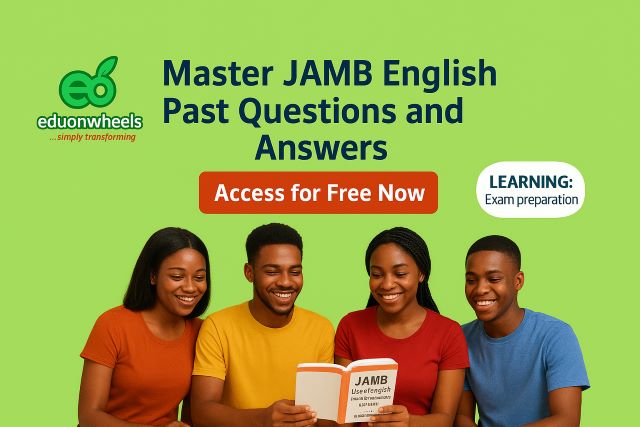
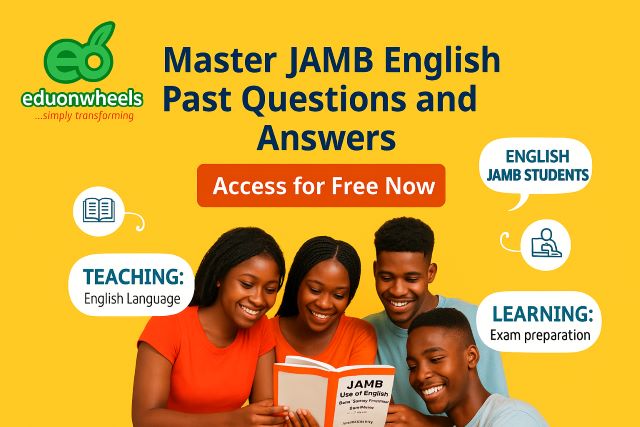




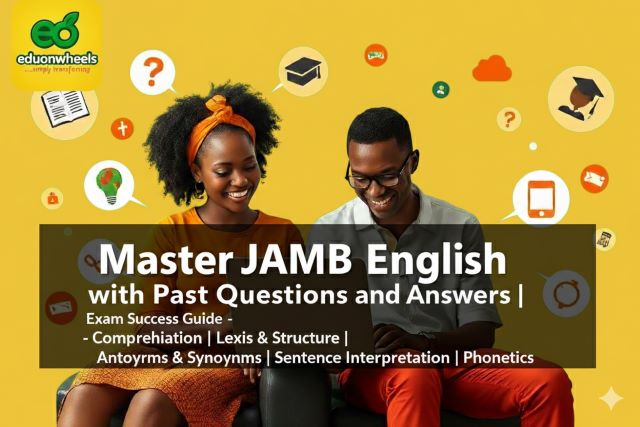
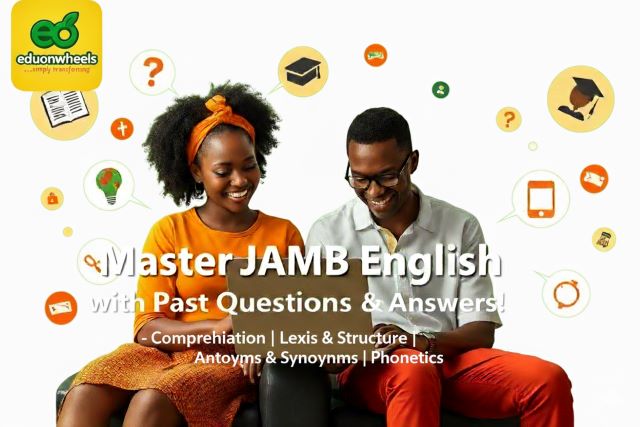
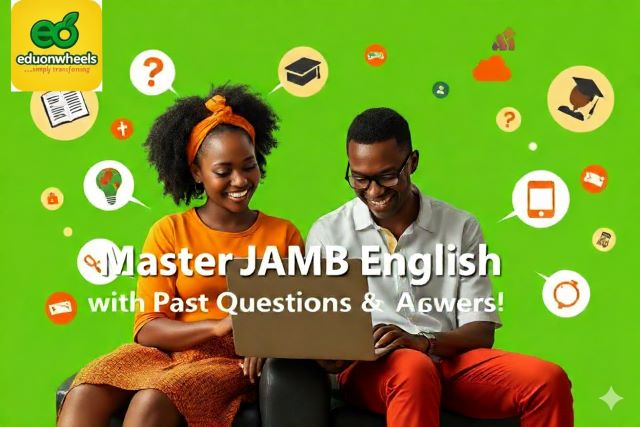
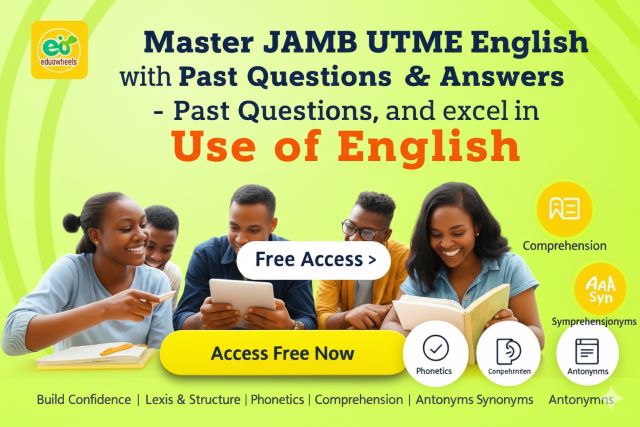

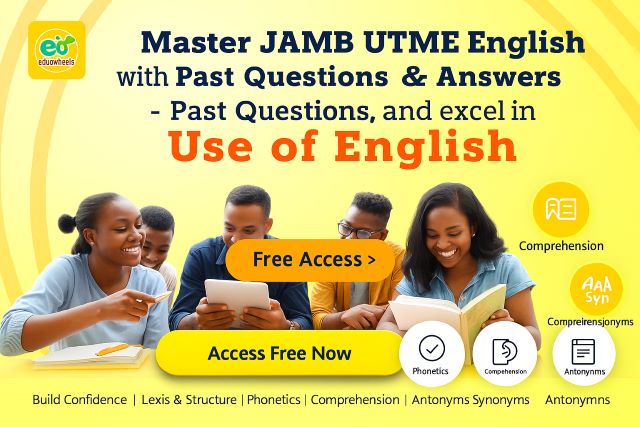

0 Comments